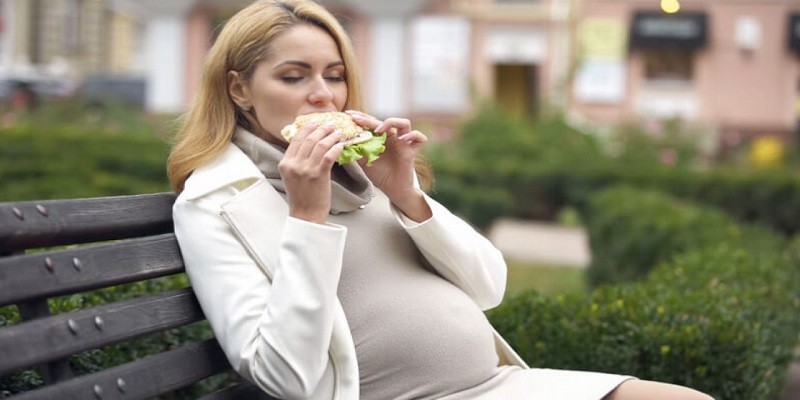Yes, you can eat a burger while pregnant, but it should be well-cooked to avoid any risks of foodborne illnesses such as listeria or toxoplasmosis. Opt for burgers made from high-quality, lean meat and limit the intake of added high-calorie toppings and condiments to maintain a healthy diet.
Pregnancy prompts many dietary concerns and questions, among them the safety of consuming burgers. While burgers are a popular and satisfying meal, they come with considerations for pregnant women. This article explores the nutritional content, possible risks, and safer consumption practices of burgers during pregnancy, providing clear guidance for expectant mothers.
What is a Burger?
A burger typically consists of a patty made from ground meat such as beef, chicken, or turkey, placed between two halves of a bun. Variations may include different types of meat or vegetarian options, as well as toppings like lettuce, tomato, cheese, onions, and condiments. Burgers are celebrated globally for their versatility and flavor.
Nutritional Value of Burger
| Nutritional Value | Details |
|---|---|
| Calories | A typical beef burger contains approximately 250-300 calories per 100 grams without any toppings or condiments. |
| Protein | Burgers are a good source of protein, offering about 17 grams per 100 grams of beef patty. |
| Fat | A beef burger has about 15-20 grams of fat, which can vary based on the meat’s leanness. |
| Carbohydrates | The bun typically contributes about 30 grams of carbohydrates. |
| Vitamins & Minerals | Contains iron, zinc, and B vitamins, particularly B12, which are beneficial during pregnancy. |
Risks of Eating Burger During Pregnancy
| Risks | Details |
|---|---|
| Foodborne Illness | Improperly cooked meat can harbor bacteria like E. coli or Listeria, which pose significant health risks during pregnancy. |
| High Sodium | Burgers can be high in sodium, which might contribute to elevated blood pressure and swelling. |
| Excessive Calories | Frequent consumption of high-calorie burgers can lead to excessive weight gain. |
| Cholesterol | High levels of saturated fat and cholesterol in burgers can impact maternal heart health. |
Safe Ways to Eating Burger During Pregnancy
When consuming burgers during pregnancy, the safest approach is to ensure the meat is thoroughly cooked to an internal temperature of 160°F to kill any harmful bacteria. Opt for whole grain buns and healthy toppings like fresh vegetables. Avoid or limit high-fat and high-sodium condiments like mayonnaise and special sauces.
Alternatives to Burger During Pregnancy
| Alternatives | Precautions |
|---|---|
| Veggie Burger | Choose options with whole ingredients like beans or lentils, and minimal processing. |
| Chicken Burger | Ensure the chicken is fully cooked and opt for skinless breast meat to lower fat intake. |
| Turkey Burger | Like chicken, ensure it’s fully cooked and opt for lean cuts to keep fat reasonable. |
| Portobello Mushroom Burger | Ensure it’s cooked well and use as a low-calorie, nutritious substitute. |
| Homemade Burger | Prepare with lean meats and control the ingredients to ensure healthier options. |
Expert Tips
- Choose Lean Meats: Opt for lean cuts of meat to prepare your burgers, as they contain fewer calories and less fat.
- Cook Thoroughly: Always ensure that the burger is cooked to a safe internal temperature to prevent foodborne diseases.
- Mind the Portion: Limit your portion sizes to avoid excessive calorie intake, which can contribute to unnecessary weight gain.
FAQs
Can I eat a rare or medium-rare burger while pregnant?
No, it is unsafe to eat undercooked meat during pregnancy due to the risk of harmful bacteria and parasites.
Is it okay to have a cheeseburger during pregnancy?
Yes, but ensure that the cheese is pasteurized and the burger is well-cooked.
How often can I eat a burger during pregnancy?
Moderation is key; consider having a burger occasionally as part of a balanced diet.
Are there any condiments to avoid on burgers during pregnancy?
Limit high-sodium sauces and unpasteurized products to reduce the risk of excessive sodium intake and bacterial exposure.
Can I make a healthier burger at home?
Yes, using lean meats, whole grain buns, and plenty of vegetables can make home-prepared burgers a healthier option.
Conclusion
While burgers can be part of a pregnant woman’s diet, they must be consumed wisely. Ensuring the meat is well-cooked and choosing healthier, high-quality ingredients are crucial steps in mitigating any potential risks associated with burger consumption during pregnancy. By making informed choices, you can enjoy burgers safely throughout your pregnancy.
Last Updated on July 31, 2024 by Marjorie R. Rogers, MA (English), Certified Consultant

